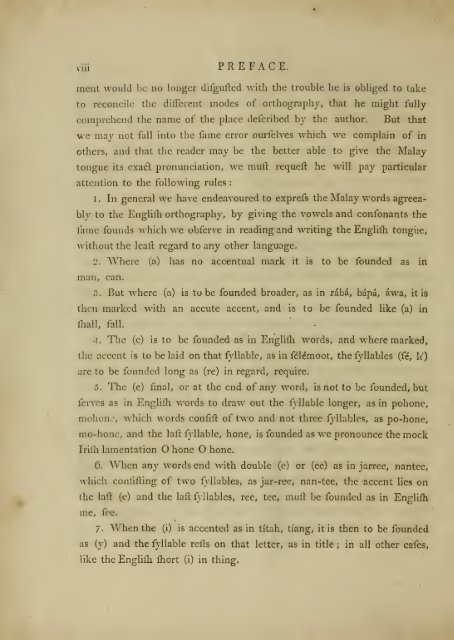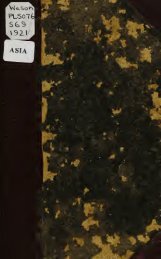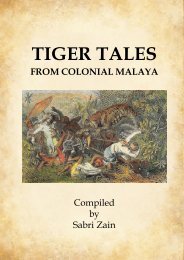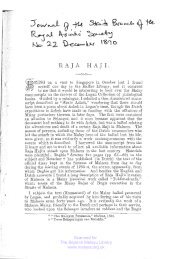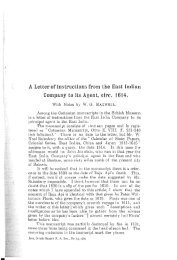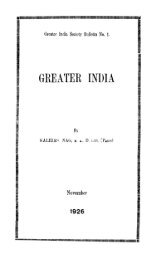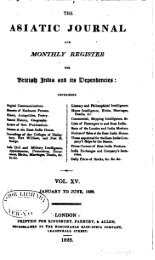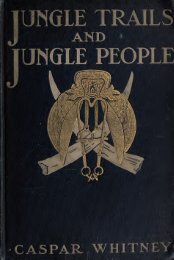A dictionary of the Malay tongue, as spoken in the ... - Sabrizain.org
A dictionary of the Malay tongue, as spoken in the ... - Sabrizain.org
A dictionary of the Malay tongue, as spoken in the ... - Sabrizain.org
You also want an ePaper? Increase the reach of your titles
YUMPU automatically turns print PDFs into web optimized ePapers that Google loves.
vai<br />
PREFACE.<br />
ment would be no longer difgufted with <strong>the</strong> trouble he is obliged to take<br />
to reconcile <strong>the</strong> different modes <strong>of</strong> orthography, that he might fully<br />
comprehend <strong>the</strong> name <strong>of</strong> <strong>the</strong> place defcribed by <strong>the</strong> author. But that<br />
we may not fall <strong>in</strong>to <strong>the</strong> fame error oui'felves which we compla<strong>in</strong> <strong>of</strong> <strong>in</strong><br />
o<strong>the</strong>rs, and that <strong>the</strong> reader may be <strong>the</strong> better able to give <strong>the</strong> <strong>Malay</strong><br />
<strong>tongue</strong> its exad; pronunciation, we mull requeft he will pay particular<br />
attention to <strong>the</strong> follow<strong>in</strong>g rules<br />
1 In general we have endeavoured to exprefs <strong>the</strong> <strong>Malay</strong> words agreea-<br />
bly to <strong>the</strong> Englifli orthography, by giv<strong>in</strong>g <strong>the</strong> vowels and confonants <strong>the</strong><br />
fame founds which we obferve <strong>in</strong> read<strong>in</strong>g and writ<strong>in</strong>g <strong>the</strong> Englifh <strong>tongue</strong>,<br />
without <strong>the</strong> leaft regard to any o<strong>the</strong>r language.<br />
2. Where (a) h<strong>as</strong> no accentual mark it is to be founded <strong>as</strong> <strong>in</strong><br />
man, can.<br />
3 But where (a) is to be founded broader, <strong>as</strong> <strong>in</strong> raba, bapa, awa, it is<br />
<strong>the</strong>n marked with an accute accent, and is to be founded like (a) <strong>in</strong><br />
Ihall, fall.<br />
4. The (e) is to be founded <strong>as</strong> <strong>in</strong> Englifh words, and where marked,<br />
<strong>the</strong> accent is to be laid on that fyllable, <strong>as</strong> <strong>in</strong> {6\6moot, <strong>the</strong> fyllables (fc, U)<br />
are to be founded long <strong>as</strong> (re) <strong>in</strong> regard, require.<br />
5. The (e) f<strong>in</strong>al, or at <strong>the</strong> end <strong>of</strong> any word, is not to be founded, but<br />
ferves <strong>as</strong> <strong>in</strong> Englifli words to draw out <strong>the</strong> fyllable longer, <strong>as</strong> <strong>in</strong> pohonc,<br />
mohono, which words confift <strong>of</strong> two and not three fyllables, <strong>as</strong> po-hone,<br />
mo-hone, and <strong>the</strong> laft fyllable, hone, is founded <strong>as</strong> we pronounce <strong>the</strong> mock<br />
Irifli lamentation O hone O hone.<br />
6. AVhen any words end with double (c) or (ee) <strong>as</strong> <strong>in</strong> jarree, nantee,<br />
which coniift<strong>in</strong>g <strong>of</strong> two fyUables, <strong>as</strong> jar-ree, nan-tee, <strong>the</strong> accent lies on<br />
<strong>the</strong> laft (e) and <strong>the</strong> laft fyllables, ree, tec, muft be founded <strong>as</strong> <strong>in</strong> Englifti<br />
me, fee.<br />
7. When <strong>the</strong> (i) is accented <strong>as</strong> <strong>in</strong> titah, ti'ang, it is <strong>the</strong>n to be founded<br />
<strong>as</strong> (y) and <strong>the</strong> fyllable refts on that letter, <strong>as</strong> <strong>in</strong> title ; <strong>in</strong> all o<strong>the</strong>r cafes,<br />
like <strong>the</strong> Englilh Ihort (i) <strong>in</strong> th<strong>in</strong>g.


